Effect of Brief Mindfulness Intervention on Stress Level and Psychological Well Being of Malaysian Young Adults
VerifiedAdded on 2023/01/17
|12
|3428
|98
AI Summary
This document explores the effect of brief mindfulness intervention on stress level and psychological well being of Malaysian young adults. It includes a literature review of mindfulness and its application on young adults, mindfulness-based stress reduction techniques, stress among Malaysian young adults, and the psychological applicability of mindfulness. The document suggests that mindfulness-based stress reduction programs can effectively reduce stress levels and promote mental health among young adults.
Contribute Materials
Your contribution can guide someone’s learning journey. Share your
documents today.
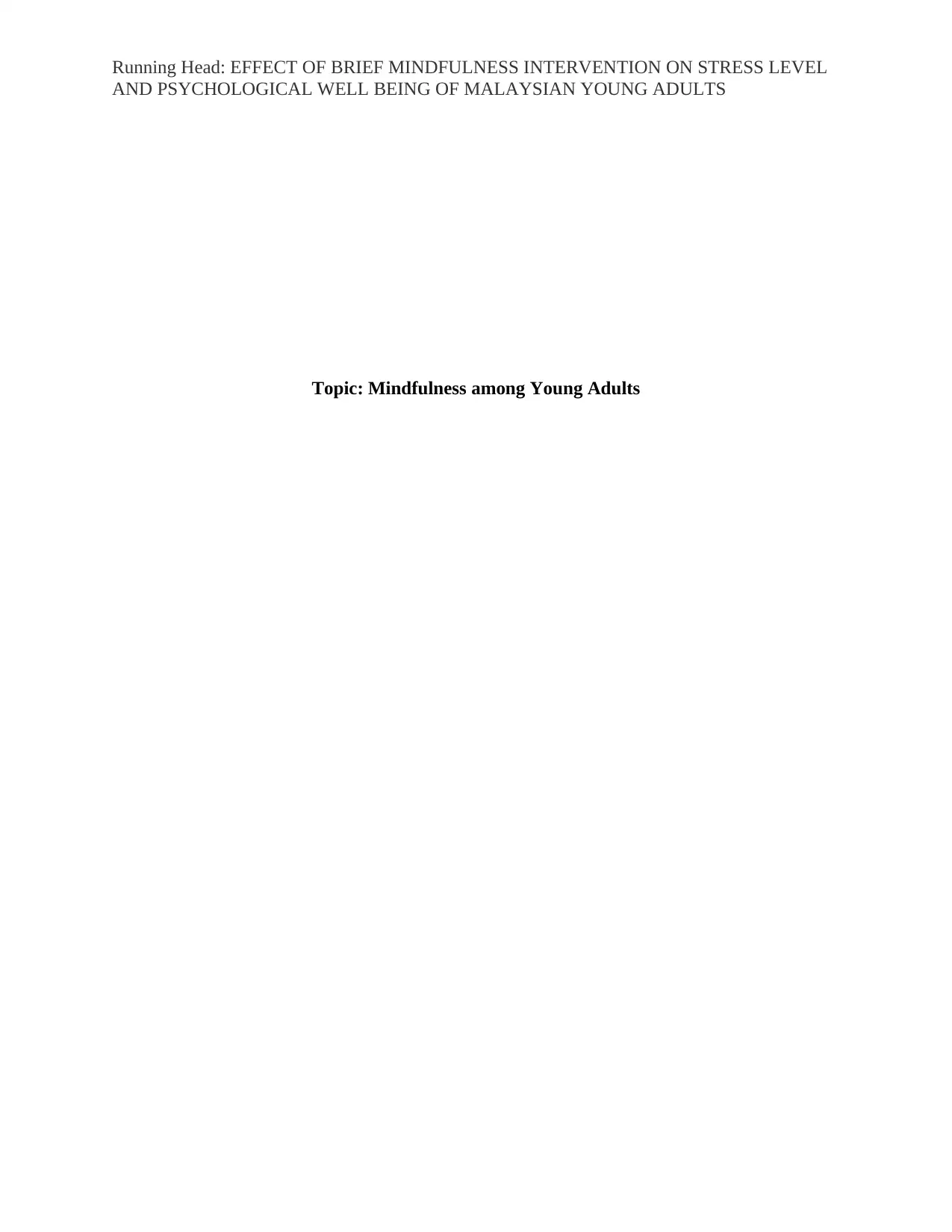
Running Head: EFFECT OF BRIEF MINDFULNESS INTERVENTION ON STRESS LEVEL
AND PSYCHOLOGICAL WELL BEING OF MALAYSIAN YOUNG ADULTS
Topic: Mindfulness among Young Adults
AND PSYCHOLOGICAL WELL BEING OF MALAYSIAN YOUNG ADULTS
Topic: Mindfulness among Young Adults
Secure Best Marks with AI Grader
Need help grading? Try our AI Grader for instant feedback on your assignments.
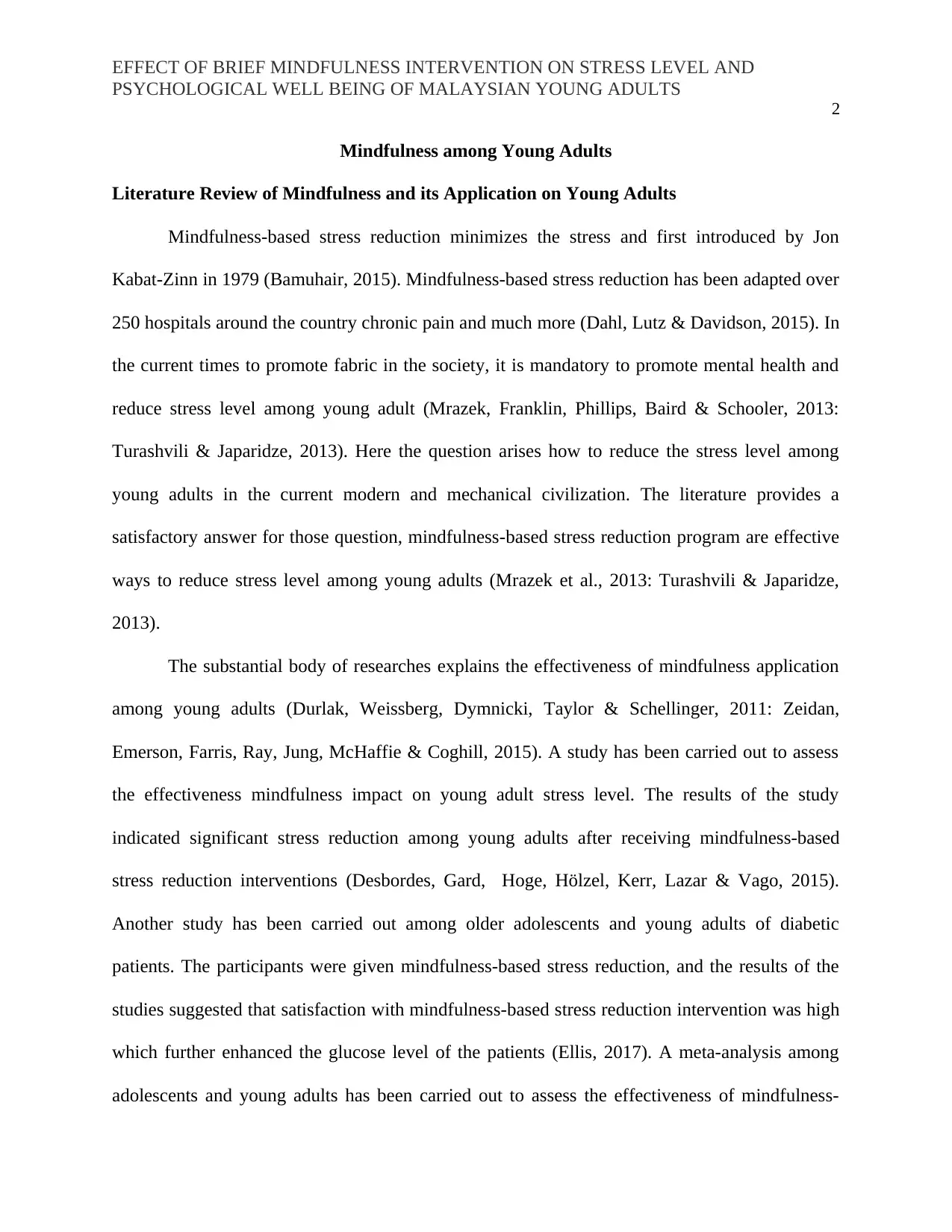
EFFECT OF BRIEF MINDFULNESS INTERVENTION ON STRESS LEVEL AND
PSYCHOLOGICAL WELL BEING OF MALAYSIAN YOUNG ADULTS
2
Mindfulness among Young Adults
Literature Review of Mindfulness and its Application on Young Adults
Mindfulness-based stress reduction minimizes the stress and first introduced by Jon
Kabat-Zinn in 1979 (Bamuhair, 2015). Mindfulness-based stress reduction has been adapted over
250 hospitals around the country chronic pain and much more (Dahl, Lutz & Davidson, 2015). In
the current times to promote fabric in the society, it is mandatory to promote mental health and
reduce stress level among young adult (Mrazek, Franklin, Phillips, Baird & Schooler, 2013:
Turashvili & Japaridze, 2013). Here the question arises how to reduce the stress level among
young adults in the current modern and mechanical civilization. The literature provides a
satisfactory answer for those question, mindfulness-based stress reduction program are effective
ways to reduce stress level among young adults (Mrazek et al., 2013: Turashvili & Japaridze,
2013).
The substantial body of researches explains the effectiveness of mindfulness application
among young adults (Durlak, Weissberg, Dymnicki, Taylor & Schellinger, 2011: Zeidan,
Emerson, Farris, Ray, Jung, McHaffie & Coghill, 2015). A study has been carried out to assess
the effectiveness mindfulness impact on young adult stress level. The results of the study
indicated significant stress reduction among young adults after receiving mindfulness-based
stress reduction interventions (Desbordes, Gard, Hoge, Hölzel, Kerr, Lazar & Vago, 2015).
Another study has been carried out among older adolescents and young adults of diabetic
patients. The participants were given mindfulness-based stress reduction, and the results of the
studies suggested that satisfaction with mindfulness-based stress reduction intervention was high
which further enhanced the glucose level of the patients (Ellis, 2017). A meta-analysis among
adolescents and young adults has been carried out to assess the effectiveness of mindfulness-
PSYCHOLOGICAL WELL BEING OF MALAYSIAN YOUNG ADULTS
2
Mindfulness among Young Adults
Literature Review of Mindfulness and its Application on Young Adults
Mindfulness-based stress reduction minimizes the stress and first introduced by Jon
Kabat-Zinn in 1979 (Bamuhair, 2015). Mindfulness-based stress reduction has been adapted over
250 hospitals around the country chronic pain and much more (Dahl, Lutz & Davidson, 2015). In
the current times to promote fabric in the society, it is mandatory to promote mental health and
reduce stress level among young adult (Mrazek, Franklin, Phillips, Baird & Schooler, 2013:
Turashvili & Japaridze, 2013). Here the question arises how to reduce the stress level among
young adults in the current modern and mechanical civilization. The literature provides a
satisfactory answer for those question, mindfulness-based stress reduction program are effective
ways to reduce stress level among young adults (Mrazek et al., 2013: Turashvili & Japaridze,
2013).
The substantial body of researches explains the effectiveness of mindfulness application
among young adults (Durlak, Weissberg, Dymnicki, Taylor & Schellinger, 2011: Zeidan,
Emerson, Farris, Ray, Jung, McHaffie & Coghill, 2015). A study has been carried out to assess
the effectiveness mindfulness impact on young adult stress level. The results of the study
indicated significant stress reduction among young adults after receiving mindfulness-based
stress reduction interventions (Desbordes, Gard, Hoge, Hölzel, Kerr, Lazar & Vago, 2015).
Another study has been carried out among older adolescents and young adults of diabetic
patients. The participants were given mindfulness-based stress reduction, and the results of the
studies suggested that satisfaction with mindfulness-based stress reduction intervention was high
which further enhanced the glucose level of the patients (Ellis, 2017). A meta-analysis among
adolescents and young adults has been carried out to assess the effectiveness of mindfulness-
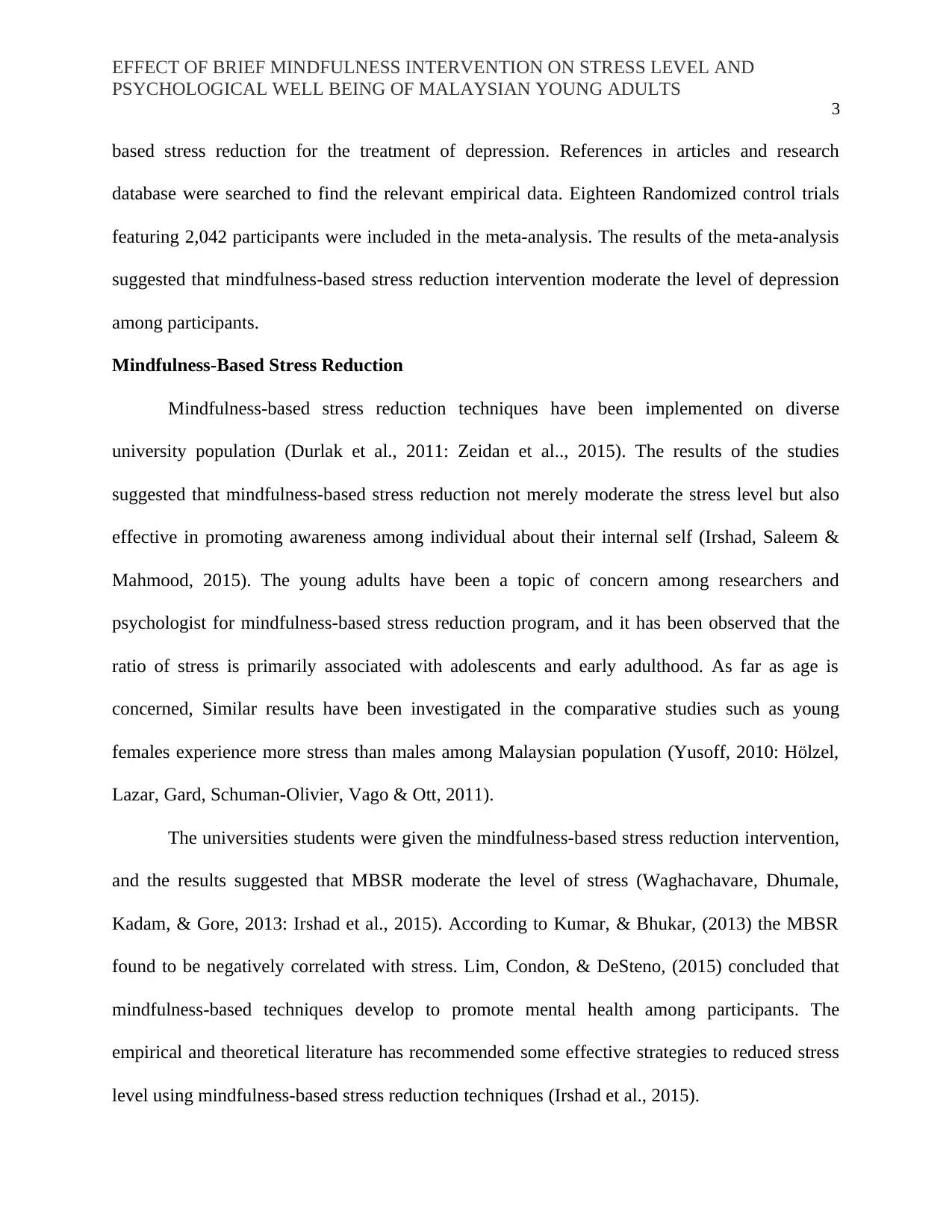
EFFECT OF BRIEF MINDFULNESS INTERVENTION ON STRESS LEVEL AND
PSYCHOLOGICAL WELL BEING OF MALAYSIAN YOUNG ADULTS
3
based stress reduction for the treatment of depression. References in articles and research
database were searched to find the relevant empirical data. Eighteen Randomized control trials
featuring 2,042 participants were included in the meta-analysis. The results of the meta-analysis
suggested that mindfulness-based stress reduction intervention moderate the level of depression
among participants.
Mindfulness-Based Stress Reduction
Mindfulness-based stress reduction techniques have been implemented on diverse
university population (Durlak et al., 2011: Zeidan et al.., 2015). The results of the studies
suggested that mindfulness-based stress reduction not merely moderate the stress level but also
effective in promoting awareness among individual about their internal self (Irshad, Saleem &
Mahmood, 2015). The young adults have been a topic of concern among researchers and
psychologist for mindfulness-based stress reduction program, and it has been observed that the
ratio of stress is primarily associated with adolescents and early adulthood. As far as age is
concerned, Similar results have been investigated in the comparative studies such as young
females experience more stress than males among Malaysian population (Yusoff, 2010: Hölzel,
Lazar, Gard, Schuman-Olivier, Vago & Ott, 2011).
The universities students were given the mindfulness-based stress reduction intervention,
and the results suggested that MBSR moderate the level of stress (Waghachavare, Dhumale,
Kadam, & Gore, 2013: Irshad et al., 2015). According to Kumar, & Bhukar, (2013) the MBSR
found to be negatively correlated with stress. Lim, Condon, & DeSteno, (2015) concluded that
mindfulness-based techniques develop to promote mental health among participants. The
empirical and theoretical literature has recommended some effective strategies to reduced stress
level using mindfulness-based stress reduction techniques (Irshad et al., 2015).
PSYCHOLOGICAL WELL BEING OF MALAYSIAN YOUNG ADULTS
3
based stress reduction for the treatment of depression. References in articles and research
database were searched to find the relevant empirical data. Eighteen Randomized control trials
featuring 2,042 participants were included in the meta-analysis. The results of the meta-analysis
suggested that mindfulness-based stress reduction intervention moderate the level of depression
among participants.
Mindfulness-Based Stress Reduction
Mindfulness-based stress reduction techniques have been implemented on diverse
university population (Durlak et al., 2011: Zeidan et al.., 2015). The results of the studies
suggested that mindfulness-based stress reduction not merely moderate the stress level but also
effective in promoting awareness among individual about their internal self (Irshad, Saleem &
Mahmood, 2015). The young adults have been a topic of concern among researchers and
psychologist for mindfulness-based stress reduction program, and it has been observed that the
ratio of stress is primarily associated with adolescents and early adulthood. As far as age is
concerned, Similar results have been investigated in the comparative studies such as young
females experience more stress than males among Malaysian population (Yusoff, 2010: Hölzel,
Lazar, Gard, Schuman-Olivier, Vago & Ott, 2011).
The universities students were given the mindfulness-based stress reduction intervention,
and the results suggested that MBSR moderate the level of stress (Waghachavare, Dhumale,
Kadam, & Gore, 2013: Irshad et al., 2015). According to Kumar, & Bhukar, (2013) the MBSR
found to be negatively correlated with stress. Lim, Condon, & DeSteno, (2015) concluded that
mindfulness-based techniques develop to promote mental health among participants. The
empirical and theoretical literature has recommended some effective strategies to reduced stress
level using mindfulness-based stress reduction techniques (Irshad et al., 2015).
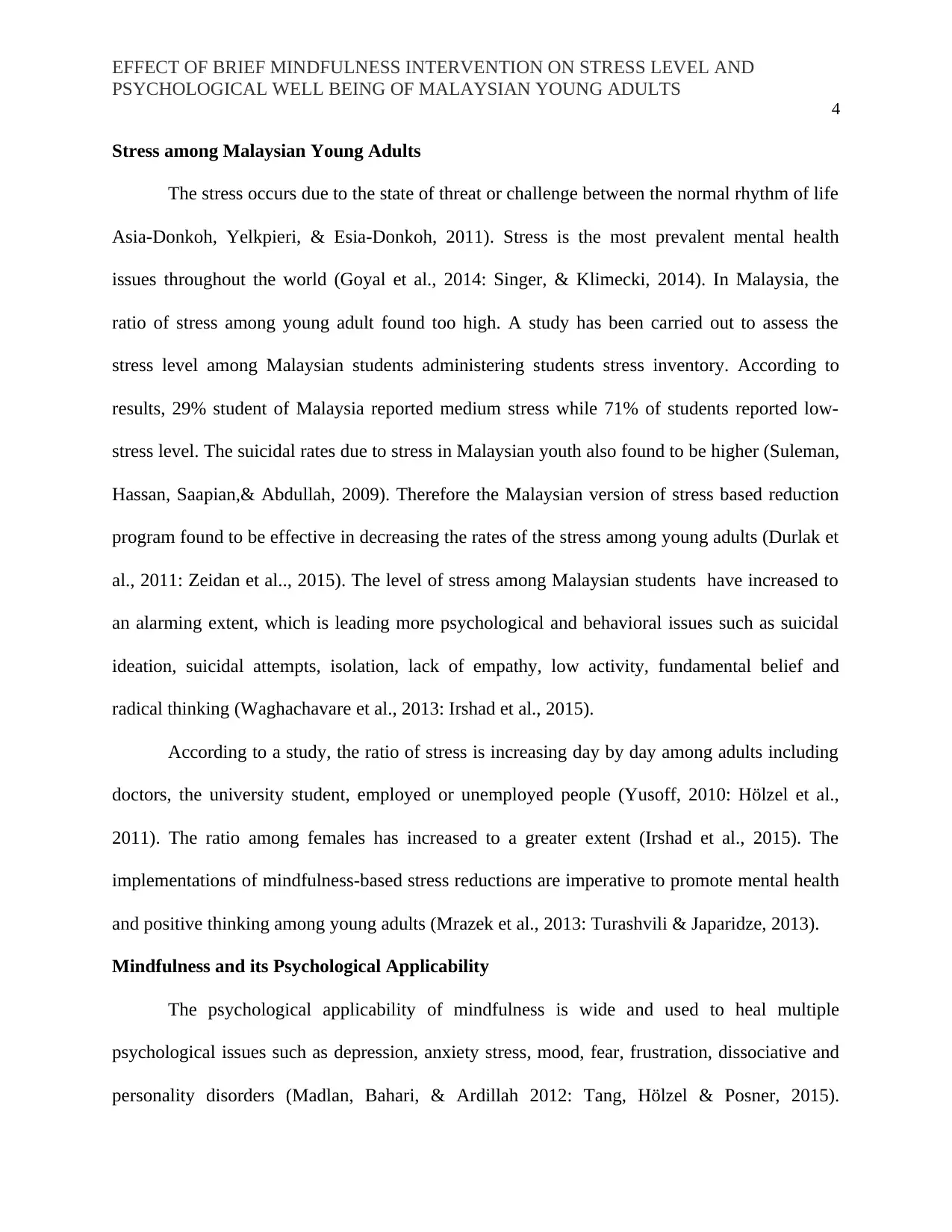
EFFECT OF BRIEF MINDFULNESS INTERVENTION ON STRESS LEVEL AND
PSYCHOLOGICAL WELL BEING OF MALAYSIAN YOUNG ADULTS
4
Stress among Malaysian Young Adults
The stress occurs due to the state of threat or challenge between the normal rhythm of life
Asia-Donkoh, Yelkpieri, & Esia-Donkoh, 2011). Stress is the most prevalent mental health
issues throughout the world (Goyal et al., 2014: Singer, & Klimecki, 2014). In Malaysia, the
ratio of stress among young adult found too high. A study has been carried out to assess the
stress level among Malaysian students administering students stress inventory. According to
results, 29% student of Malaysia reported medium stress while 71% of students reported low-
stress level. The suicidal rates due to stress in Malaysian youth also found to be higher (Suleman,
Hassan, Saapian,& Abdullah, 2009). Therefore the Malaysian version of stress based reduction
program found to be effective in decreasing the rates of the stress among young adults (Durlak et
al., 2011: Zeidan et al.., 2015). The level of stress among Malaysian students have increased to
an alarming extent, which is leading more psychological and behavioral issues such as suicidal
ideation, suicidal attempts, isolation, lack of empathy, low activity, fundamental belief and
radical thinking (Waghachavare et al., 2013: Irshad et al., 2015).
According to a study, the ratio of stress is increasing day by day among adults including
doctors, the university student, employed or unemployed people (Yusoff, 2010: Hölzel et al.,
2011). The ratio among females has increased to a greater extent (Irshad et al., 2015). The
implementations of mindfulness-based stress reductions are imperative to promote mental health
and positive thinking among young adults (Mrazek et al., 2013: Turashvili & Japaridze, 2013).
Mindfulness and its Psychological Applicability
The psychological applicability of mindfulness is wide and used to heal multiple
psychological issues such as depression, anxiety stress, mood, fear, frustration, dissociative and
personality disorders (Madlan, Bahari, & Ardillah 2012: Tang, Hölzel & Posner, 2015).
PSYCHOLOGICAL WELL BEING OF MALAYSIAN YOUNG ADULTS
4
Stress among Malaysian Young Adults
The stress occurs due to the state of threat or challenge between the normal rhythm of life
Asia-Donkoh, Yelkpieri, & Esia-Donkoh, 2011). Stress is the most prevalent mental health
issues throughout the world (Goyal et al., 2014: Singer, & Klimecki, 2014). In Malaysia, the
ratio of stress among young adult found too high. A study has been carried out to assess the
stress level among Malaysian students administering students stress inventory. According to
results, 29% student of Malaysia reported medium stress while 71% of students reported low-
stress level. The suicidal rates due to stress in Malaysian youth also found to be higher (Suleman,
Hassan, Saapian,& Abdullah, 2009). Therefore the Malaysian version of stress based reduction
program found to be effective in decreasing the rates of the stress among young adults (Durlak et
al., 2011: Zeidan et al.., 2015). The level of stress among Malaysian students have increased to
an alarming extent, which is leading more psychological and behavioral issues such as suicidal
ideation, suicidal attempts, isolation, lack of empathy, low activity, fundamental belief and
radical thinking (Waghachavare et al., 2013: Irshad et al., 2015).
According to a study, the ratio of stress is increasing day by day among adults including
doctors, the university student, employed or unemployed people (Yusoff, 2010: Hölzel et al.,
2011). The ratio among females has increased to a greater extent (Irshad et al., 2015). The
implementations of mindfulness-based stress reductions are imperative to promote mental health
and positive thinking among young adults (Mrazek et al., 2013: Turashvili & Japaridze, 2013).
Mindfulness and its Psychological Applicability
The psychological applicability of mindfulness is wide and used to heal multiple
psychological issues such as depression, anxiety stress, mood, fear, frustration, dissociative and
personality disorders (Madlan, Bahari, & Ardillah 2012: Tang, Hölzel & Posner, 2015).
Secure Best Marks with AI Grader
Need help grading? Try our AI Grader for instant feedback on your assignments.
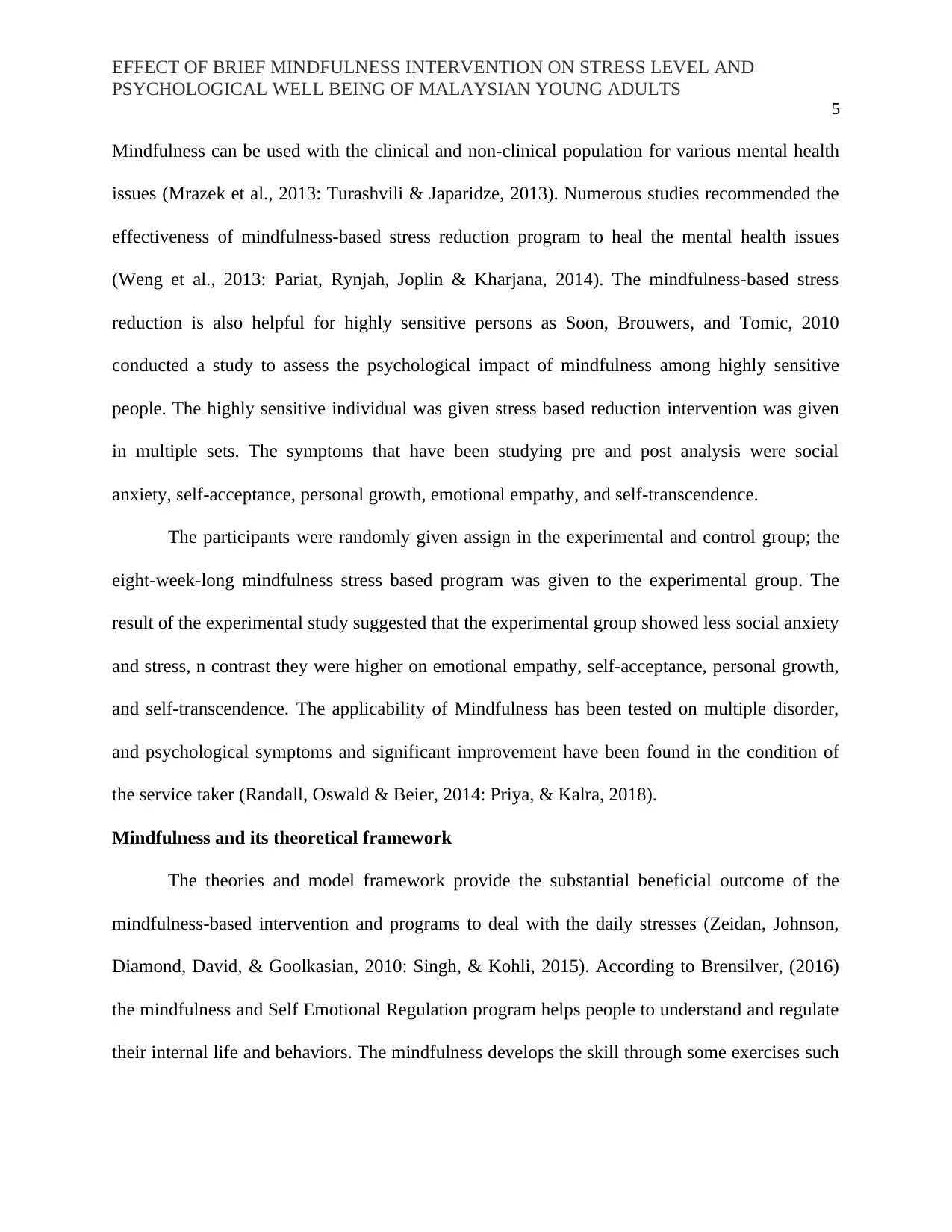
EFFECT OF BRIEF MINDFULNESS INTERVENTION ON STRESS LEVEL AND
PSYCHOLOGICAL WELL BEING OF MALAYSIAN YOUNG ADULTS
5
Mindfulness can be used with the clinical and non-clinical population for various mental health
issues (Mrazek et al., 2013: Turashvili & Japaridze, 2013). Numerous studies recommended the
effectiveness of mindfulness-based stress reduction program to heal the mental health issues
(Weng et al., 2013: Pariat, Rynjah, Joplin & Kharjana, 2014). The mindfulness-based stress
reduction is also helpful for highly sensitive persons as Soon, Brouwers, and Tomic, 2010
conducted a study to assess the psychological impact of mindfulness among highly sensitive
people. The highly sensitive individual was given stress based reduction intervention was given
in multiple sets. The symptoms that have been studying pre and post analysis were social
anxiety, self-acceptance, personal growth, emotional empathy, and self-transcendence.
The participants were randomly given assign in the experimental and control group; the
eight-week-long mindfulness stress based program was given to the experimental group. The
result of the experimental study suggested that the experimental group showed less social anxiety
and stress, n contrast they were higher on emotional empathy, self-acceptance, personal growth,
and self-transcendence. The applicability of Mindfulness has been tested on multiple disorder,
and psychological symptoms and significant improvement have been found in the condition of
the service taker (Randall, Oswald & Beier, 2014: Priya, & Kalra, 2018).
Mindfulness and its theoretical framework
The theories and model framework provide the substantial beneficial outcome of the
mindfulness-based intervention and programs to deal with the daily stresses (Zeidan, Johnson,
Diamond, David, & Goolkasian, 2010: Singh, & Kohli, 2015). According to Brensilver, (2016)
the mindfulness and Self Emotional Regulation program helps people to understand and regulate
their internal life and behaviors. The mindfulness develops the skill through some exercises such
PSYCHOLOGICAL WELL BEING OF MALAYSIAN YOUNG ADULTS
5
Mindfulness can be used with the clinical and non-clinical population for various mental health
issues (Mrazek et al., 2013: Turashvili & Japaridze, 2013). Numerous studies recommended the
effectiveness of mindfulness-based stress reduction program to heal the mental health issues
(Weng et al., 2013: Pariat, Rynjah, Joplin & Kharjana, 2014). The mindfulness-based stress
reduction is also helpful for highly sensitive persons as Soon, Brouwers, and Tomic, 2010
conducted a study to assess the psychological impact of mindfulness among highly sensitive
people. The highly sensitive individual was given stress based reduction intervention was given
in multiple sets. The symptoms that have been studying pre and post analysis were social
anxiety, self-acceptance, personal growth, emotional empathy, and self-transcendence.
The participants were randomly given assign in the experimental and control group; the
eight-week-long mindfulness stress based program was given to the experimental group. The
result of the experimental study suggested that the experimental group showed less social anxiety
and stress, n contrast they were higher on emotional empathy, self-acceptance, personal growth,
and self-transcendence. The applicability of Mindfulness has been tested on multiple disorder,
and psychological symptoms and significant improvement have been found in the condition of
the service taker (Randall, Oswald & Beier, 2014: Priya, & Kalra, 2018).
Mindfulness and its theoretical framework
The theories and model framework provide the substantial beneficial outcome of the
mindfulness-based intervention and programs to deal with the daily stresses (Zeidan, Johnson,
Diamond, David, & Goolkasian, 2010: Singh, & Kohli, 2015). According to Brensilver, (2016)
the mindfulness and Self Emotional Regulation program helps people to understand and regulate
their internal life and behaviors. The mindfulness develops the skill through some exercises such
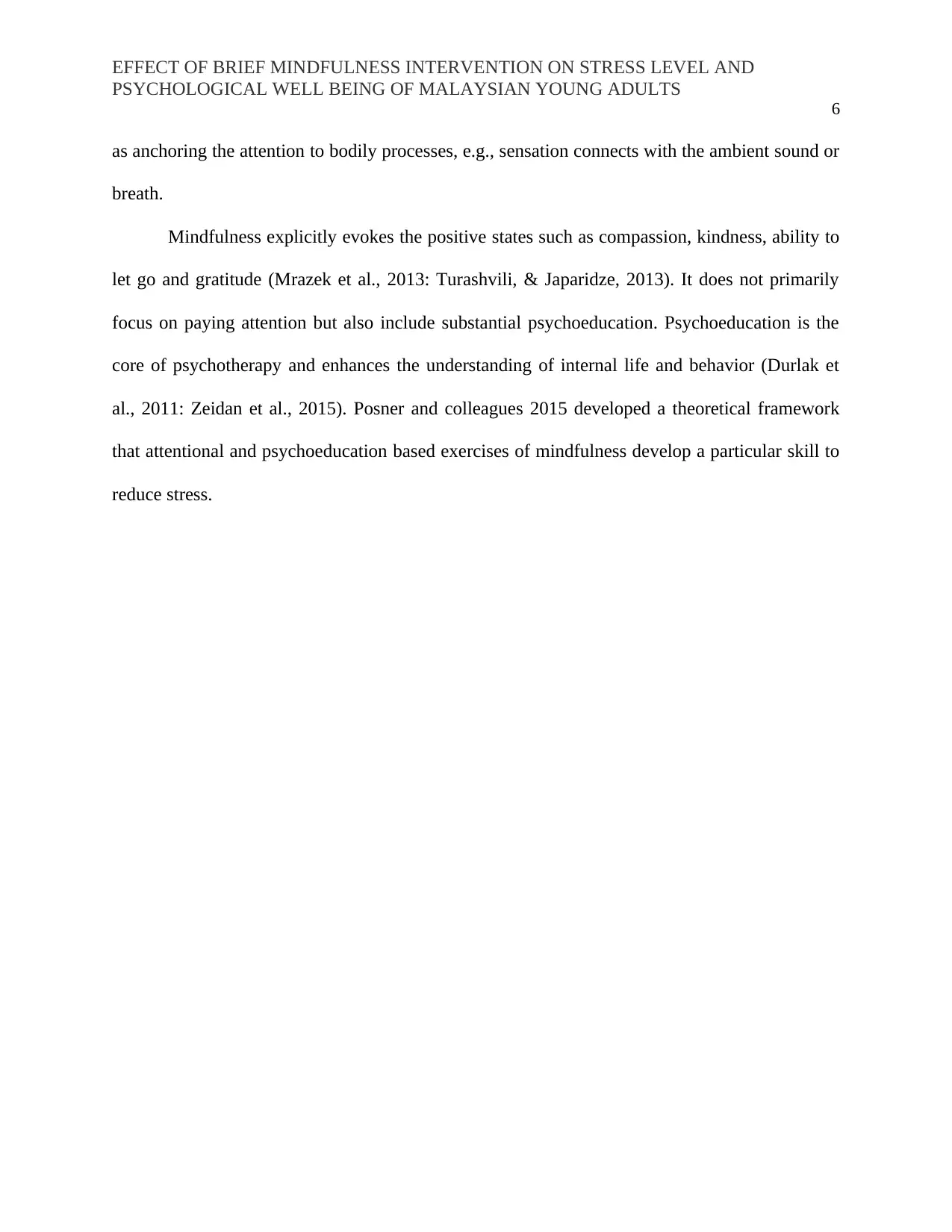
EFFECT OF BRIEF MINDFULNESS INTERVENTION ON STRESS LEVEL AND
PSYCHOLOGICAL WELL BEING OF MALAYSIAN YOUNG ADULTS
6
as anchoring the attention to bodily processes, e.g., sensation connects with the ambient sound or
breath.
Mindfulness explicitly evokes the positive states such as compassion, kindness, ability to
let go and gratitude (Mrazek et al., 2013: Turashvili, & Japaridze, 2013). It does not primarily
focus on paying attention but also include substantial psychoeducation. Psychoeducation is the
core of psychotherapy and enhances the understanding of internal life and behavior (Durlak et
al., 2011: Zeidan et al., 2015). Posner and colleagues 2015 developed a theoretical framework
that attentional and psychoeducation based exercises of mindfulness develop a particular skill to
reduce stress.
PSYCHOLOGICAL WELL BEING OF MALAYSIAN YOUNG ADULTS
6
as anchoring the attention to bodily processes, e.g., sensation connects with the ambient sound or
breath.
Mindfulness explicitly evokes the positive states such as compassion, kindness, ability to
let go and gratitude (Mrazek et al., 2013: Turashvili, & Japaridze, 2013). It does not primarily
focus on paying attention but also include substantial psychoeducation. Psychoeducation is the
core of psychotherapy and enhances the understanding of internal life and behavior (Durlak et
al., 2011: Zeidan et al., 2015). Posner and colleagues 2015 developed a theoretical framework
that attentional and psychoeducation based exercises of mindfulness develop a particular skill to
reduce stress.
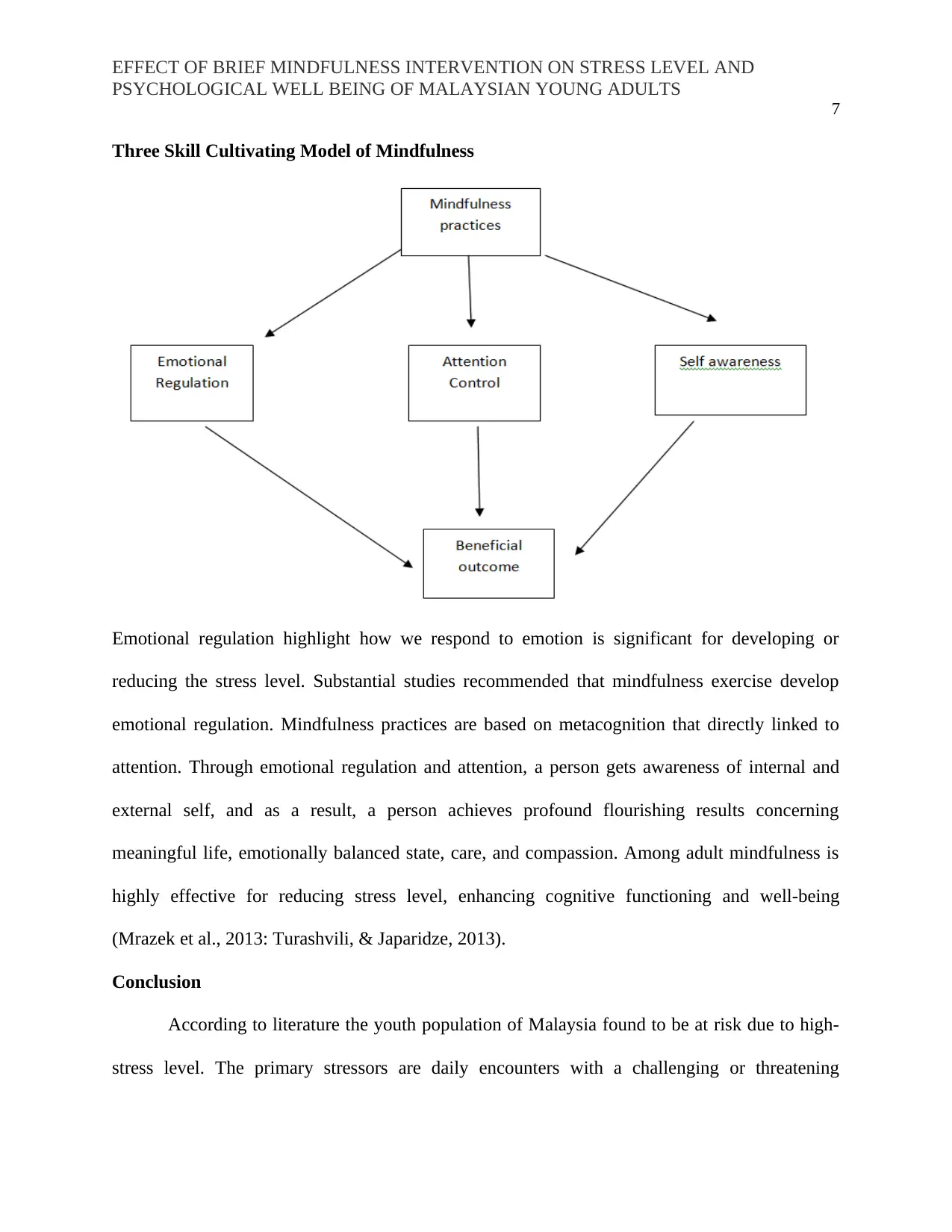
EFFECT OF BRIEF MINDFULNESS INTERVENTION ON STRESS LEVEL AND
PSYCHOLOGICAL WELL BEING OF MALAYSIAN YOUNG ADULTS
7
Three Skill Cultivating Model of Mindfulness
Emotional regulation highlight how we respond to emotion is significant for developing or
reducing the stress level. Substantial studies recommended that mindfulness exercise develop
emotional regulation. Mindfulness practices are based on metacognition that directly linked to
attention. Through emotional regulation and attention, a person gets awareness of internal and
external self, and as a result, a person achieves profound flourishing results concerning
meaningful life, emotionally balanced state, care, and compassion. Among adult mindfulness is
highly effective for reducing stress level, enhancing cognitive functioning and well-being
(Mrazek et al., 2013: Turashvili, & Japaridze, 2013).
Conclusion
According to literature the youth population of Malaysia found to be at risk due to high-
stress level. The primary stressors are daily encounters with a challenging or threatening
PSYCHOLOGICAL WELL BEING OF MALAYSIAN YOUNG ADULTS
7
Three Skill Cultivating Model of Mindfulness
Emotional regulation highlight how we respond to emotion is significant for developing or
reducing the stress level. Substantial studies recommended that mindfulness exercise develop
emotional regulation. Mindfulness practices are based on metacognition that directly linked to
attention. Through emotional regulation and attention, a person gets awareness of internal and
external self, and as a result, a person achieves profound flourishing results concerning
meaningful life, emotionally balanced state, care, and compassion. Among adult mindfulness is
highly effective for reducing stress level, enhancing cognitive functioning and well-being
(Mrazek et al., 2013: Turashvili, & Japaridze, 2013).
Conclusion
According to literature the youth population of Malaysia found to be at risk due to high-
stress level. The primary stressors are daily encounters with a challenging or threatening
Paraphrase This Document
Need a fresh take? Get an instant paraphrase of this document with our AI Paraphraser
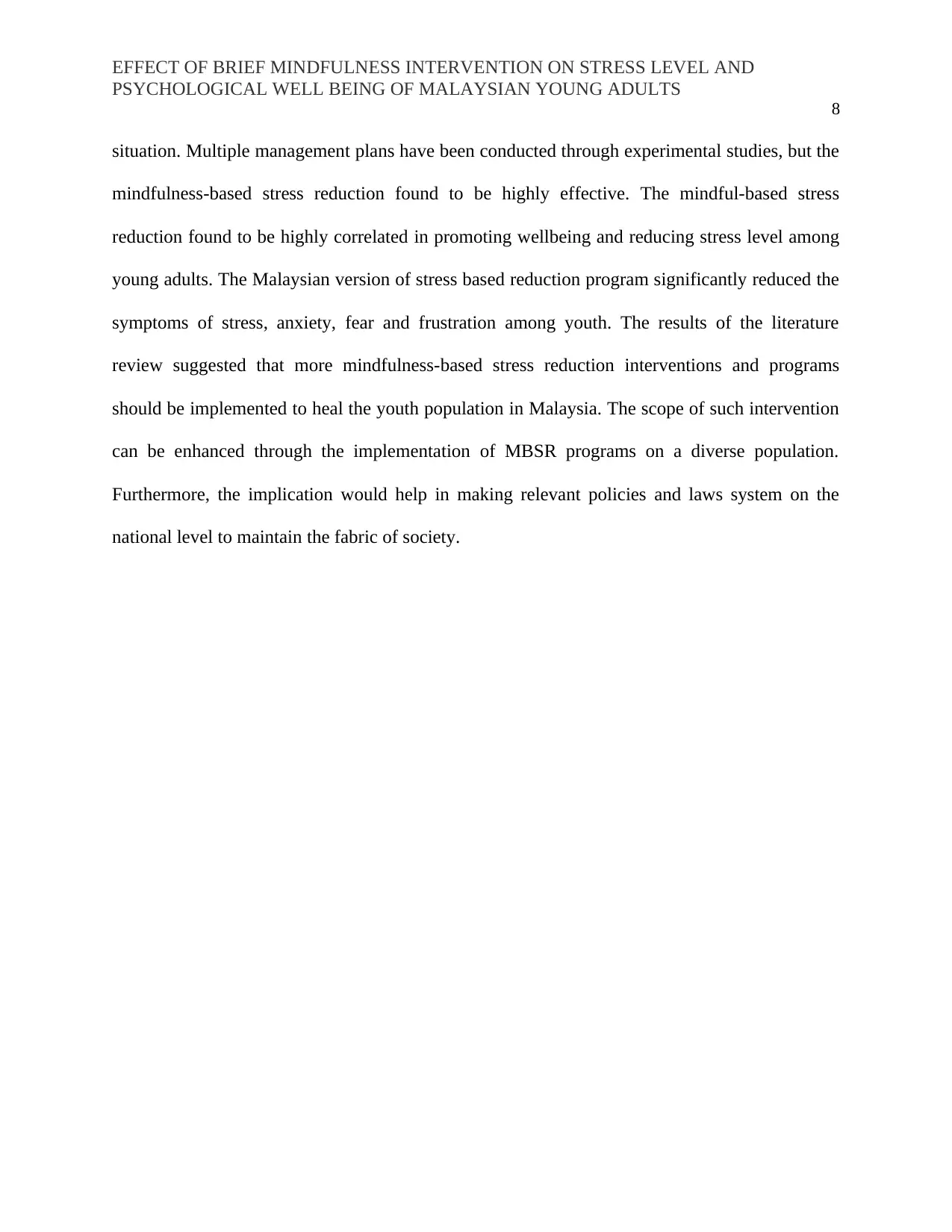
EFFECT OF BRIEF MINDFULNESS INTERVENTION ON STRESS LEVEL AND
PSYCHOLOGICAL WELL BEING OF MALAYSIAN YOUNG ADULTS
8
situation. Multiple management plans have been conducted through experimental studies, but the
mindfulness-based stress reduction found to be highly effective. The mindful-based stress
reduction found to be highly correlated in promoting wellbeing and reducing stress level among
young adults. The Malaysian version of stress based reduction program significantly reduced the
symptoms of stress, anxiety, fear and frustration among youth. The results of the literature
review suggested that more mindfulness-based stress reduction interventions and programs
should be implemented to heal the youth population in Malaysia. The scope of such intervention
can be enhanced through the implementation of MBSR programs on a diverse population.
Furthermore, the implication would help in making relevant policies and laws system on the
national level to maintain the fabric of society.
PSYCHOLOGICAL WELL BEING OF MALAYSIAN YOUNG ADULTS
8
situation. Multiple management plans have been conducted through experimental studies, but the
mindfulness-based stress reduction found to be highly effective. The mindful-based stress
reduction found to be highly correlated in promoting wellbeing and reducing stress level among
young adults. The Malaysian version of stress based reduction program significantly reduced the
symptoms of stress, anxiety, fear and frustration among youth. The results of the literature
review suggested that more mindfulness-based stress reduction interventions and programs
should be implemented to heal the youth population in Malaysia. The scope of such intervention
can be enhanced through the implementation of MBSR programs on a diverse population.
Furthermore, the implication would help in making relevant policies and laws system on the
national level to maintain the fabric of society.
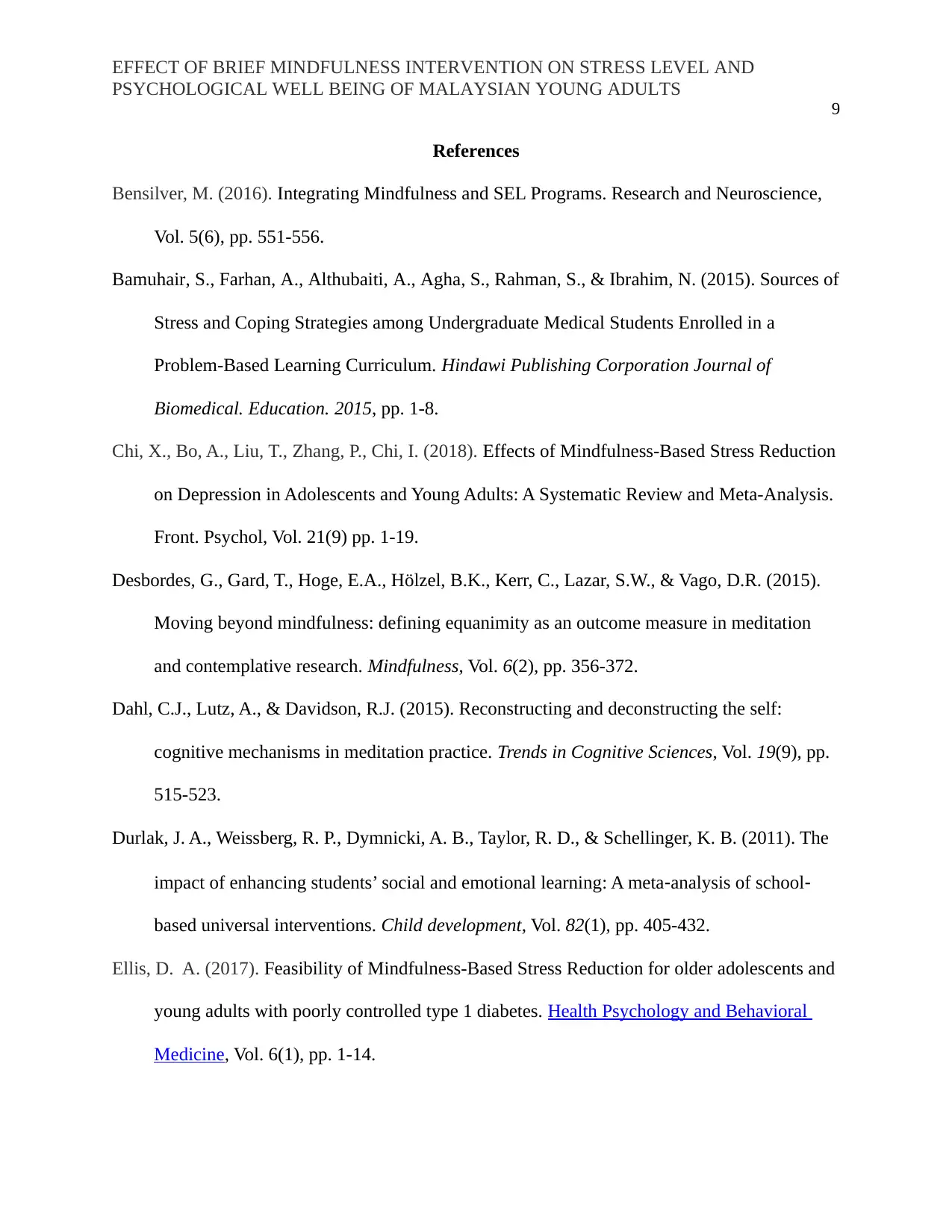
EFFECT OF BRIEF MINDFULNESS INTERVENTION ON STRESS LEVEL AND
PSYCHOLOGICAL WELL BEING OF MALAYSIAN YOUNG ADULTS
9
References
Bensilver, M. (2016). Integrating Mindfulness and SEL Programs. Research and Neuroscience,
Vol. 5(6), pp. 551-556.
Bamuhair, S., Farhan, A., Althubaiti, A., Agha, S., Rahman, S., & Ibrahim, N. (2015). Sources of
Stress and Coping Strategies among Undergraduate Medical Students Enrolled in a
Problem-Based Learning Curriculum. Hindawi Publishing Corporation Journal of
Biomedical. Education. 2015, pp. 1-8.
Chi, X., Bo, A., Liu, T., Zhang, P., Chi, I. (2018). Effects of Mindfulness-Based Stress Reduction
on Depression in Adolescents and Young Adults: A Systematic Review and Meta-Analysis.
Front. Psychol, Vol. 21(9) pp. 1-19.
Desbordes, G., Gard, T., Hoge, E.A., Hölzel, B.K., Kerr, C., Lazar, S.W., & Vago, D.R. (2015).
Moving beyond mindfulness: defining equanimity as an outcome measure in meditation
and contemplative research. Mindfulness, Vol. 6(2), pp. 356-372.
Dahl, C.J., Lutz, A., & Davidson, R.J. (2015). Reconstructing and deconstructing the self:
cognitive mechanisms in meditation practice. Trends in Cognitive Sciences, Vol. 19(9), pp.
515-523.
Durlak, J. A., Weissberg, R. P., Dymnicki, A. B., Taylor, R. D., & Schellinger, K. B. (2011). The
impact of enhancing students’ social and emotional learning: A meta‐analysis of school‐
based universal interventions. Child development, Vol. 82(1), pp. 405-432.
Ellis, D. A. (2017). Feasibility of Mindfulness-Based Stress Reduction for older adolescents and
young adults with poorly controlled type 1 diabetes. Health Psychology and Behavioral
Medicine, Vol. 6(1), pp. 1-14.
PSYCHOLOGICAL WELL BEING OF MALAYSIAN YOUNG ADULTS
9
References
Bensilver, M. (2016). Integrating Mindfulness and SEL Programs. Research and Neuroscience,
Vol. 5(6), pp. 551-556.
Bamuhair, S., Farhan, A., Althubaiti, A., Agha, S., Rahman, S., & Ibrahim, N. (2015). Sources of
Stress and Coping Strategies among Undergraduate Medical Students Enrolled in a
Problem-Based Learning Curriculum. Hindawi Publishing Corporation Journal of
Biomedical. Education. 2015, pp. 1-8.
Chi, X., Bo, A., Liu, T., Zhang, P., Chi, I. (2018). Effects of Mindfulness-Based Stress Reduction
on Depression in Adolescents and Young Adults: A Systematic Review and Meta-Analysis.
Front. Psychol, Vol. 21(9) pp. 1-19.
Desbordes, G., Gard, T., Hoge, E.A., Hölzel, B.K., Kerr, C., Lazar, S.W., & Vago, D.R. (2015).
Moving beyond mindfulness: defining equanimity as an outcome measure in meditation
and contemplative research. Mindfulness, Vol. 6(2), pp. 356-372.
Dahl, C.J., Lutz, A., & Davidson, R.J. (2015). Reconstructing and deconstructing the self:
cognitive mechanisms in meditation practice. Trends in Cognitive Sciences, Vol. 19(9), pp.
515-523.
Durlak, J. A., Weissberg, R. P., Dymnicki, A. B., Taylor, R. D., & Schellinger, K. B. (2011). The
impact of enhancing students’ social and emotional learning: A meta‐analysis of school‐
based universal interventions. Child development, Vol. 82(1), pp. 405-432.
Ellis, D. A. (2017). Feasibility of Mindfulness-Based Stress Reduction for older adolescents and
young adults with poorly controlled type 1 diabetes. Health Psychology and Behavioral
Medicine, Vol. 6(1), pp. 1-14.
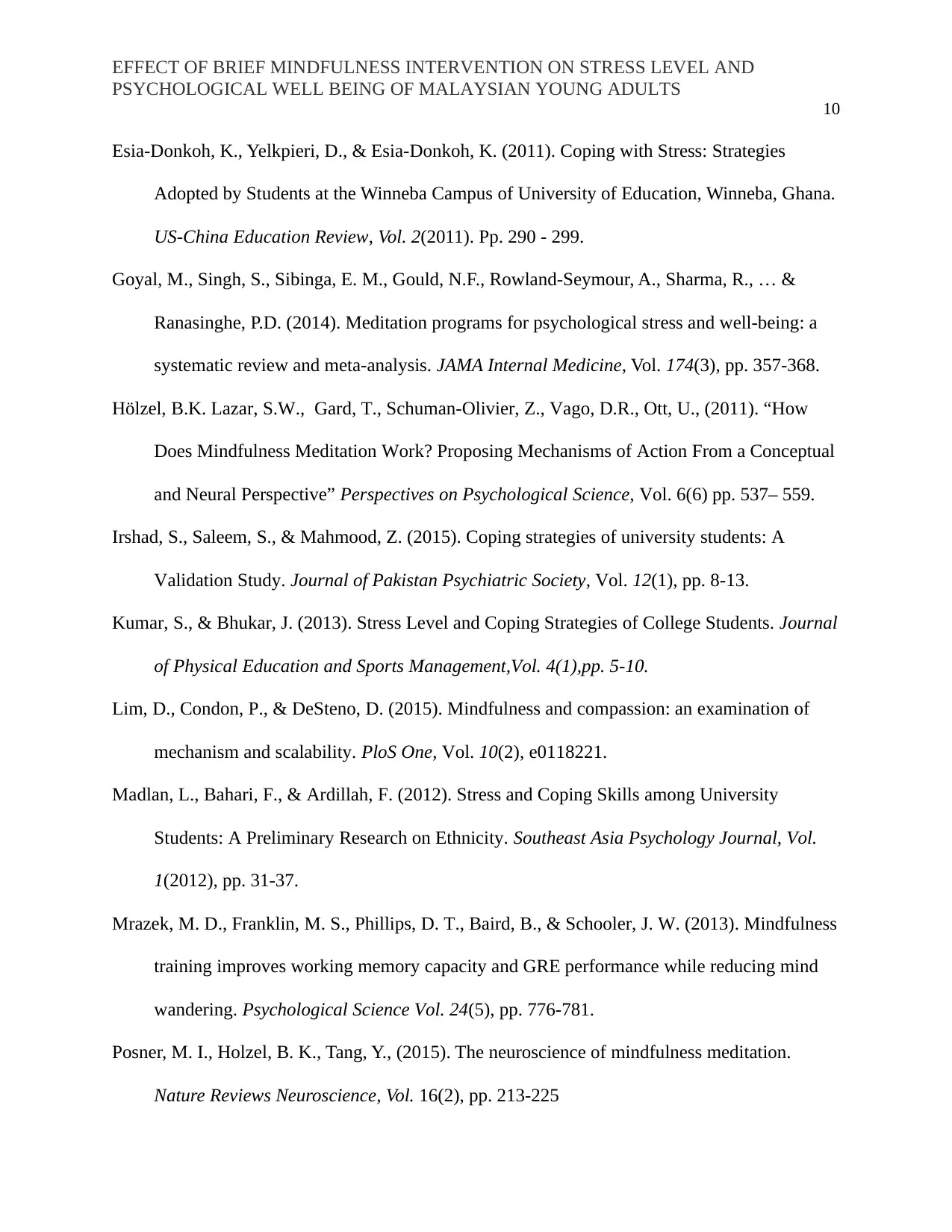
EFFECT OF BRIEF MINDFULNESS INTERVENTION ON STRESS LEVEL AND
PSYCHOLOGICAL WELL BEING OF MALAYSIAN YOUNG ADULTS
10
Esia-Donkoh, K., Yelkpieri, D., & Esia-Donkoh, K. (2011). Coping with Stress: Strategies
Adopted by Students at the Winneba Campus of University of Education, Winneba, Ghana.
US-China Education Review, Vol. 2(2011). Pp. 290 - 299.
Goyal, M., Singh, S., Sibinga, E. M., Gould, N.F., Rowland-Seymour, A., Sharma, R., … &
Ranasinghe, P.D. (2014). Meditation programs for psychological stress and well-being: a
systematic review and meta-analysis. JAMA Internal Medicine, Vol. 174(3), pp. 357-368.
Hölzel, B.K. Lazar, S.W., Gard, T., Schuman-Olivier, Z., Vago, D.R., Ott, U., (2011). “How
Does Mindfulness Meditation Work? Proposing Mechanisms of Action From a Conceptual
and Neural Perspective” Perspectives on Psychological Science, Vol. 6(6) pp. 537– 559.
Irshad, S., Saleem, S., & Mahmood, Z. (2015). Coping strategies of university students: A
Validation Study. Journal of Pakistan Psychiatric Society, Vol. 12(1), pp. 8-13.
Kumar, S., & Bhukar, J. (2013). Stress Level and Coping Strategies of College Students. Journal
of Physical Education and Sports Management,Vol. 4(1),pp. 5-10.
Lim, D., Condon, P., & DeSteno, D. (2015). Mindfulness and compassion: an examination of
mechanism and scalability. PloS One, Vol. 10(2), e0118221.
Madlan, L., Bahari, F., & Ardillah, F. (2012). Stress and Coping Skills among University
Students: A Preliminary Research on Ethnicity. Southeast Asia Psychology Journal, Vol.
1(2012), pp. 31-37.
Mrazek, M. D., Franklin, M. S., Phillips, D. T., Baird, B., & Schooler, J. W. (2013). Mindfulness
training improves working memory capacity and GRE performance while reducing mind
wandering. Psychological Science Vol. 24(5), pp. 776-781.
Posner, M. I., Holzel, B. K., Tang, Y., (2015). The neuroscience of mindfulness meditation.
Nature Reviews Neuroscience, Vol. 16(2), pp. 213-225
PSYCHOLOGICAL WELL BEING OF MALAYSIAN YOUNG ADULTS
10
Esia-Donkoh, K., Yelkpieri, D., & Esia-Donkoh, K. (2011). Coping with Stress: Strategies
Adopted by Students at the Winneba Campus of University of Education, Winneba, Ghana.
US-China Education Review, Vol. 2(2011). Pp. 290 - 299.
Goyal, M., Singh, S., Sibinga, E. M., Gould, N.F., Rowland-Seymour, A., Sharma, R., … &
Ranasinghe, P.D. (2014). Meditation programs for psychological stress and well-being: a
systematic review and meta-analysis. JAMA Internal Medicine, Vol. 174(3), pp. 357-368.
Hölzel, B.K. Lazar, S.W., Gard, T., Schuman-Olivier, Z., Vago, D.R., Ott, U., (2011). “How
Does Mindfulness Meditation Work? Proposing Mechanisms of Action From a Conceptual
and Neural Perspective” Perspectives on Psychological Science, Vol. 6(6) pp. 537– 559.
Irshad, S., Saleem, S., & Mahmood, Z. (2015). Coping strategies of university students: A
Validation Study. Journal of Pakistan Psychiatric Society, Vol. 12(1), pp. 8-13.
Kumar, S., & Bhukar, J. (2013). Stress Level and Coping Strategies of College Students. Journal
of Physical Education and Sports Management,Vol. 4(1),pp. 5-10.
Lim, D., Condon, P., & DeSteno, D. (2015). Mindfulness and compassion: an examination of
mechanism and scalability. PloS One, Vol. 10(2), e0118221.
Madlan, L., Bahari, F., & Ardillah, F. (2012). Stress and Coping Skills among University
Students: A Preliminary Research on Ethnicity. Southeast Asia Psychology Journal, Vol.
1(2012), pp. 31-37.
Mrazek, M. D., Franklin, M. S., Phillips, D. T., Baird, B., & Schooler, J. W. (2013). Mindfulness
training improves working memory capacity and GRE performance while reducing mind
wandering. Psychological Science Vol. 24(5), pp. 776-781.
Posner, M. I., Holzel, B. K., Tang, Y., (2015). The neuroscience of mindfulness meditation.
Nature Reviews Neuroscience, Vol. 16(2), pp. 213-225
Secure Best Marks with AI Grader
Need help grading? Try our AI Grader for instant feedback on your assignments.
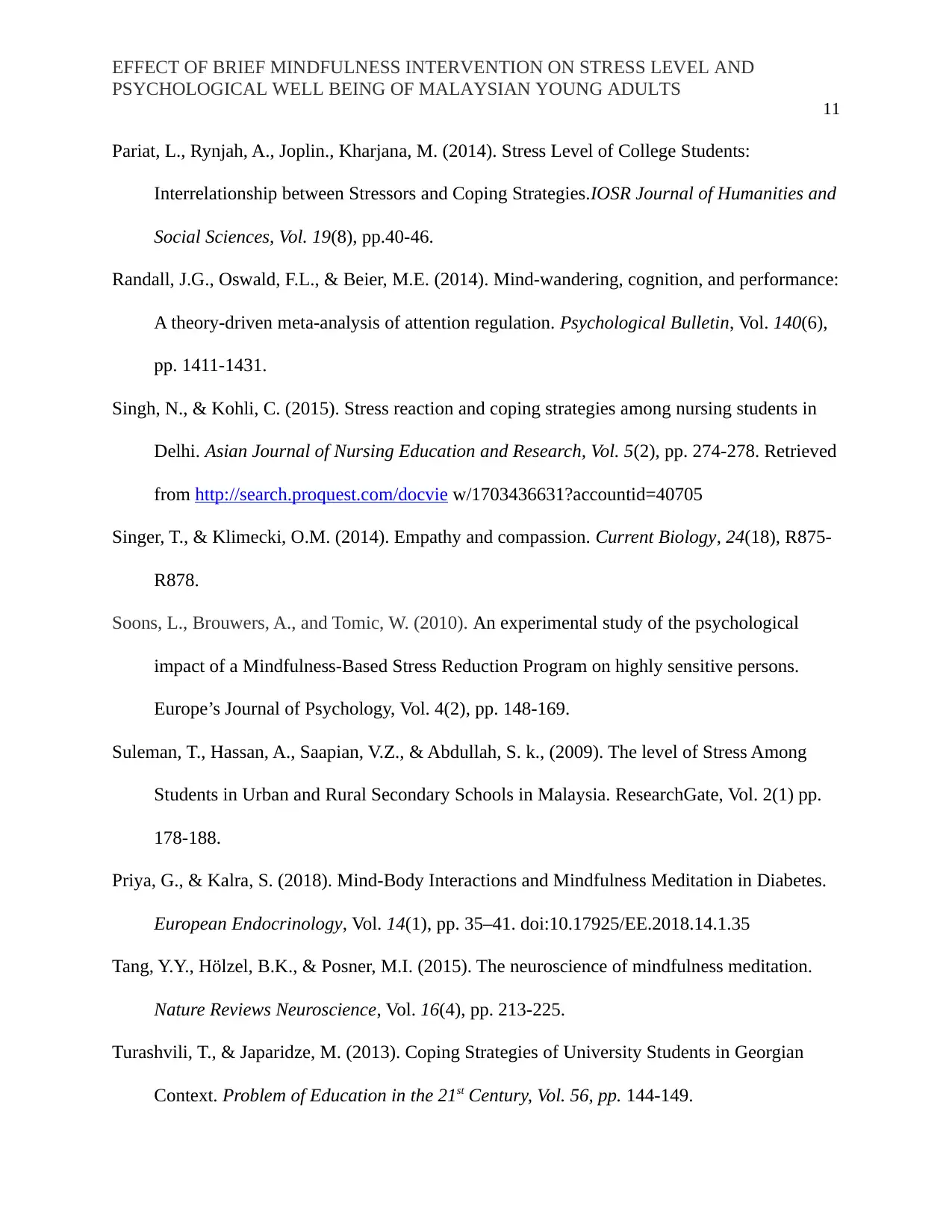
EFFECT OF BRIEF MINDFULNESS INTERVENTION ON STRESS LEVEL AND
PSYCHOLOGICAL WELL BEING OF MALAYSIAN YOUNG ADULTS
11
Pariat, L., Rynjah, A., Joplin., Kharjana, M. (2014). Stress Level of College Students:
Interrelationship between Stressors and Coping Strategies.IOSR Journal of Humanities and
Social Sciences, Vol. 19(8), pp.40-46.
Randall, J.G., Oswald, F.L., & Beier, M.E. (2014). Mind-wandering, cognition, and performance:
A theory-driven meta-analysis of attention regulation. Psychological Bulletin, Vol. 140(6),
pp. 1411-1431.
Singh, N., & Kohli, C. (2015). Stress reaction and coping strategies among nursing students in
Delhi. Asian Journal of Nursing Education and Research, Vol. 5(2), pp. 274-278. Retrieved
from http://search.proquest.com/docvie w/1703436631?accountid=40705
Singer, T., & Klimecki, O.M. (2014). Empathy and compassion. Current Biology, 24(18), R875-
R878.
Soons, L., Brouwers, A., and Tomic, W. (2010). An experimental study of the psychological
impact of a Mindfulness-Based Stress Reduction Program on highly sensitive persons.
Europe’s Journal of Psychology, Vol. 4(2), pp. 148-169.
Suleman, T., Hassan, A., Saapian, V.Z., & Abdullah, S. k., (2009). The level of Stress Among
Students in Urban and Rural Secondary Schools in Malaysia. ResearchGate, Vol. 2(1) pp.
178-188.
Priya, G., & Kalra, S. (2018). Mind-Body Interactions and Mindfulness Meditation in Diabetes.
European Endocrinology, Vol. 14(1), pp. 35–41. doi:10.17925/EE.2018.14.1.35
Tang, Y.Y., Hölzel, B.K., & Posner, M.I. (2015). The neuroscience of mindfulness meditation.
Nature Reviews Neuroscience, Vol. 16(4), pp. 213-225.
Turashvili, T., & Japaridze, M. (2013). Coping Strategies of University Students in Georgian
Context. Problem of Education in the 21st Century, Vol. 56, pp. 144-149.
PSYCHOLOGICAL WELL BEING OF MALAYSIAN YOUNG ADULTS
11
Pariat, L., Rynjah, A., Joplin., Kharjana, M. (2014). Stress Level of College Students:
Interrelationship between Stressors and Coping Strategies.IOSR Journal of Humanities and
Social Sciences, Vol. 19(8), pp.40-46.
Randall, J.G., Oswald, F.L., & Beier, M.E. (2014). Mind-wandering, cognition, and performance:
A theory-driven meta-analysis of attention regulation. Psychological Bulletin, Vol. 140(6),
pp. 1411-1431.
Singh, N., & Kohli, C. (2015). Stress reaction and coping strategies among nursing students in
Delhi. Asian Journal of Nursing Education and Research, Vol. 5(2), pp. 274-278. Retrieved
from http://search.proquest.com/docvie w/1703436631?accountid=40705
Singer, T., & Klimecki, O.M. (2014). Empathy and compassion. Current Biology, 24(18), R875-
R878.
Soons, L., Brouwers, A., and Tomic, W. (2010). An experimental study of the psychological
impact of a Mindfulness-Based Stress Reduction Program on highly sensitive persons.
Europe’s Journal of Psychology, Vol. 4(2), pp. 148-169.
Suleman, T., Hassan, A., Saapian, V.Z., & Abdullah, S. k., (2009). The level of Stress Among
Students in Urban and Rural Secondary Schools in Malaysia. ResearchGate, Vol. 2(1) pp.
178-188.
Priya, G., & Kalra, S. (2018). Mind-Body Interactions and Mindfulness Meditation in Diabetes.
European Endocrinology, Vol. 14(1), pp. 35–41. doi:10.17925/EE.2018.14.1.35
Tang, Y.Y., Hölzel, B.K., & Posner, M.I. (2015). The neuroscience of mindfulness meditation.
Nature Reviews Neuroscience, Vol. 16(4), pp. 213-225.
Turashvili, T., & Japaridze, M. (2013). Coping Strategies of University Students in Georgian
Context. Problem of Education in the 21st Century, Vol. 56, pp. 144-149.
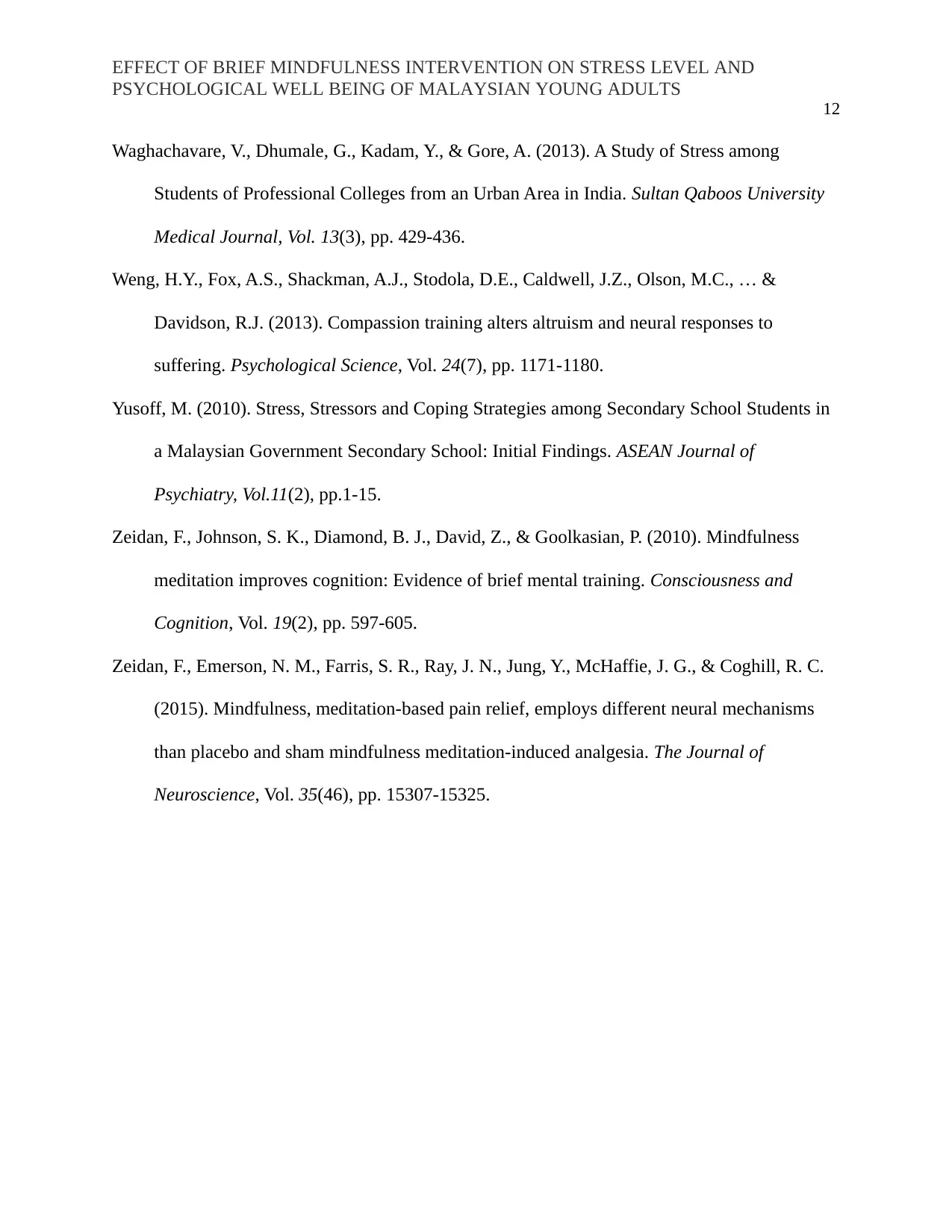
EFFECT OF BRIEF MINDFULNESS INTERVENTION ON STRESS LEVEL AND
PSYCHOLOGICAL WELL BEING OF MALAYSIAN YOUNG ADULTS
12
Waghachavare, V., Dhumale, G., Kadam, Y., & Gore, A. (2013). A Study of Stress among
Students of Professional Colleges from an Urban Area in India. Sultan Qaboos University
Medical Journal, Vol. 13(3), pp. 429-436.
Weng, H.Y., Fox, A.S., Shackman, A.J., Stodola, D.E., Caldwell, J.Z., Olson, M.C., … &
Davidson, R.J. (2013). Compassion training alters altruism and neural responses to
suffering. Psychological Science, Vol. 24(7), pp. 1171-1180.
Yusoff, M. (2010). Stress, Stressors and Coping Strategies among Secondary School Students in
a Malaysian Government Secondary School: Initial Findings. ASEAN Journal of
Psychiatry, Vol.11(2), pp.1-15.
Zeidan, F., Johnson, S. K., Diamond, B. J., David, Z., & Goolkasian, P. (2010). Mindfulness
meditation improves cognition: Evidence of brief mental training. Consciousness and
Cognition, Vol. 19(2), pp. 597-605.
Zeidan, F., Emerson, N. M., Farris, S. R., Ray, J. N., Jung, Y., McHaffie, J. G., & Coghill, R. C.
(2015). Mindfulness, meditation-based pain relief, employs different neural mechanisms
than placebo and sham mindfulness meditation-induced analgesia. The Journal of
Neuroscience, Vol. 35(46), pp. 15307-15325.
PSYCHOLOGICAL WELL BEING OF MALAYSIAN YOUNG ADULTS
12
Waghachavare, V., Dhumale, G., Kadam, Y., & Gore, A. (2013). A Study of Stress among
Students of Professional Colleges from an Urban Area in India. Sultan Qaboos University
Medical Journal, Vol. 13(3), pp. 429-436.
Weng, H.Y., Fox, A.S., Shackman, A.J., Stodola, D.E., Caldwell, J.Z., Olson, M.C., … &
Davidson, R.J. (2013). Compassion training alters altruism and neural responses to
suffering. Psychological Science, Vol. 24(7), pp. 1171-1180.
Yusoff, M. (2010). Stress, Stressors and Coping Strategies among Secondary School Students in
a Malaysian Government Secondary School: Initial Findings. ASEAN Journal of
Psychiatry, Vol.11(2), pp.1-15.
Zeidan, F., Johnson, S. K., Diamond, B. J., David, Z., & Goolkasian, P. (2010). Mindfulness
meditation improves cognition: Evidence of brief mental training. Consciousness and
Cognition, Vol. 19(2), pp. 597-605.
Zeidan, F., Emerson, N. M., Farris, S. R., Ray, J. N., Jung, Y., McHaffie, J. G., & Coghill, R. C.
(2015). Mindfulness, meditation-based pain relief, employs different neural mechanisms
than placebo and sham mindfulness meditation-induced analgesia. The Journal of
Neuroscience, Vol. 35(46), pp. 15307-15325.
1 out of 12
Related Documents
Your All-in-One AI-Powered Toolkit for Academic Success.
+13062052269
info@desklib.com
Available 24*7 on WhatsApp / Email
![[object Object]](/_next/static/media/star-bottom.7253800d.svg)
Unlock your academic potential
© 2024 | Zucol Services PVT LTD | All rights reserved.





